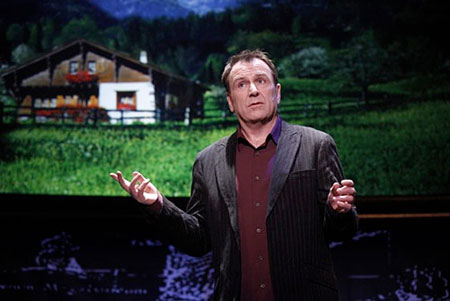
So, this colonialist walks into a pizza joint and battles wit with an imperialist. It's ancient history, broken down into bite-sized nuggets of comical notes, delivered to audiences by comedian Colin Quinn. Such is the premise of Long Story Short, the former SNL cast-member's current starring vehicle on Broadway. Funny? Mostly. Entertaining? Laughing theatergoers seem to think so. A Broadway show? Not by a long shot. It's stand-up comedy.
Broadway has a long history of staging one-person shows, from the storied Mark Twain Tonight created by Hal Holbrook, 700 Sundays starring Billy Crystal, and Lily Tomlin's The Search For Signs of Intelligent Life in the Universe. Each of these lauded productions are full of laughs, zingers, and many other terms often used when describing a comic act, but unlike Quinn's Long Story Short, these shows are built around characters and narratives. Not a 75-minute version of "Weekend Update" material.
At some point in the course of Broadway commercialization, the fine art of theatre became watered down by the slightly cruder, albeit enjoyable world of stand-up comedy. In order to fill seats in a Broadway house, the likes of Mario Cantone and Quinn started earning equal billing with Gypsy and A Little Night Music. Packing a theatre with paying customers is certainly a good business practice, but billing a stand-up comedy act as a Broadway show is disrespectful.

Television went through a similar period of diluted entertainment when Fox came up with the bright idea to put cameras on a bunch of real-life cops and package it as prime-time programming. "Cops" led to an onslaught of reality television, a syndrome still infecting both network and cable television, often making the chances of a new original scripted show getting green lit extremely slim. Stand-up comedy packaged as a Broadway show is no different than reality television being sold to viewers as quality programming.
Stand-up comedians of the '70s worked hard to craft personas and acts that went against the concept of cultural art. As author Richard Zoglin noted in his book Comedy at the Edge, "[Lenny] Bruce made fun of old show-biz and lashed out at Hollywood phonies. Steve Martin satirized the same thing by turning himself into the showbiz phony." Fast forward a few decades and you have those same personas playing up to Tony Award voters.
When the American Theatre Wing went so far as to create a category at the Tony Awards for recognition of the season's "Best Special Theatrical Event" in 2001, these stand-up comedy shows, like Cantone's Laugh Whore, became eligible for Broadway's highest honor. Despite the ill-advised award category being "retired" after only nine years, a show like Long Story Short, directed by Jerry Seinfeld, continues to earn the moniker of a Broadway show, including having a traditional Playbill printed for its run.
If any form of entertainment can so easily join the ranks of theatrical productions, what's to stop a band from renting out a theatre on the Rialto and playing a concert under the guise of a Broadway show? Obviously, nothing, as the '80s band Duran Duran proved in 2007 when they put up shop in the Ethel Barrymore Theater for a brief stint, which included those recognizable black and yellow Playbills.
Passing off stand-up comedy as a Broadway show, intentionally or not, does nothing but confuse the terminology of theatrical standards, whatever those might be. The next time someone bumps into Stephen Sondheim, why not ask him if he thinks Long Story Short should be up on the shelf alongside A Funny Thing Happened on the Way to the Forum.
Photo courtesy of Carol Rosegg.
